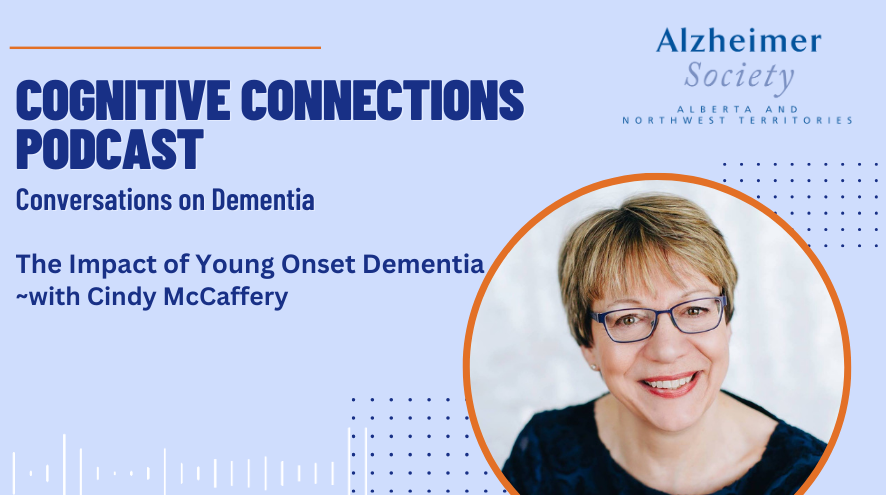The Impact of Young Onset Dementia: A Conversation with Cindy McCaffrey
Cindy shares her personal experience with her husband's diagnosis and the inspiration behind YouQuest. Through her story, we explore the importance of socialization, support, and the need for greater awareness and understanding of young onset dementia.

Listen to the conversation here.
In this conversation with Cindy McCaffrey, co-founder of YouQuest, a charity that operates a wellness day program for Calgarians under the age of 65 living with dementia, we gain valuable insights into the journey of a care partner and the challenges faced by those living with young onset dementia.
The Journey of Young Onset Dementia
Cindy McCaffrey's journey with her husband's diagnosis of young-onset dementia began in 2007. She vividly recalls the day her husband came home from work, expressing his confusion and struggles with his clients and martial arts training. After months of testing, they received the news that John's brain was degenerating, and he had frontotemporal dementia. While the diagnosis was shocking, Cindy and John were not entirely surprised, as John's father had also experienced young-onset Alzheimer's.
From the early stages of the diagnosis, Cindy and John made the decision to simplify their lives, move into a smaller house, and be open with their children about the situation. They wanted to maintain as much normalcy as possible.
”[John] was always looking out for the care partner, so he made it kind of his daily goal to help out around the house, help me as much as he could help with the kids.”
The Need for a Supportive Community
As she explains in the podcast, one of the significant challenges Cindy and John encountered was finding a suitable day program for John to stay engaged while Cindy was at work. Most programs were designed for individuals over 65, and the options available were often sedentary and did not meet John's need for physical activity. This led Cindy to co-found YouQuest, a charity that operates a wellness day program specifically for Calgarians under the age of 65 living with dementia.
Through focus groups and conversations with potential participants and care partners, Cindy and her team designed an active wellness day program that focuses on providing choice and socialization. The program includes activities such as basketball, pickleball, walks by the river, and visits to museums. The participants also have the opportunity to enjoy meals together at local restaurants, fostering a sense of community and peer support.
The Role of Recreational Therapists
Recreational therapists play a crucial role in dementia care. They meet with potential participants and their families to understand their backgrounds, abilities, and preferences. This information helps tailor the program to ensure that participants enjoy their time and feel engaged. The therapists also provide ongoing support and guidance to both participants and care partners, helping them navigate the challenges of living with dementia.
The Impact on Care Partners and Families
“I always say, well, one person has dementia, but the 12 or 20 people in their lives are also affected.”
Cindy emphasizes the importance of recognizing the impact of young-onset dementia on care partners and families. The diagnosis can have a profound effect on children, and they can have feelings of sadness, anxiety, and confusion. Families with younger children face additional challenges, as they navigate the complexities of dementia while balancing work and financial responsibilities.
The workplace can be particularly challenging for those living with dementia and for care partners, as there is often a lack of understanding and support. Many care partners may have to give up their careers to provide full-time care, which can add to financial strain and feelings of isolation. The stigma surrounding dementia further exacerbates the situation, making it difficult for care partners to find the support they need.
Spreading Awareness and Fighting Stigma
“We try to spread the word every day. Everyone we talk to, we try to talk about it.”
Cindy believes that raising awareness and fighting the stigma associated with dementia are crucial steps in supporting individuals living with young-onset dementia and their care partners. It is essential to recognize that dementia can affect anyone, regardless of age, and that individuals living with dementia can still contribute to society in meaningful ways.
“[John] still tries to help even though he can't make dinner anymore. He'll pick up some dim sum and reheat it. He calls it ‘heat and eat’... and that's been wonderful. And then there were times when I've just been so down and he has just a sunny attitude and somehow he cheers me up.”
By educating the public about the realities of dementia and promoting understanding and empathy, we can create a more inclusive and supportive environment for those affected by the disease. Cindy encourages everyone to show kindness and compassion to individuals who may be struggling with their words or actions.
Conclusion
The impact of young-onset dementia extends beyond the individual diagnosed, affecting families, children, and the workplace. It is crucial to raise awareness, fight stigma, and provide resources and support for care partners and families. Through initiatives like YouQuest and the dedication of volunteers like Cindy, we can create a more inclusive and compassionate society for those living with dementia.
Thank you for joining us on this episode of Cognitive Connections Conversations on Dementia. Listen to the full episode wherever you get your podcasts and on YouTube. Stay tuned for more enlightening discussions as we continue to unravel the intricacies of dementia.
